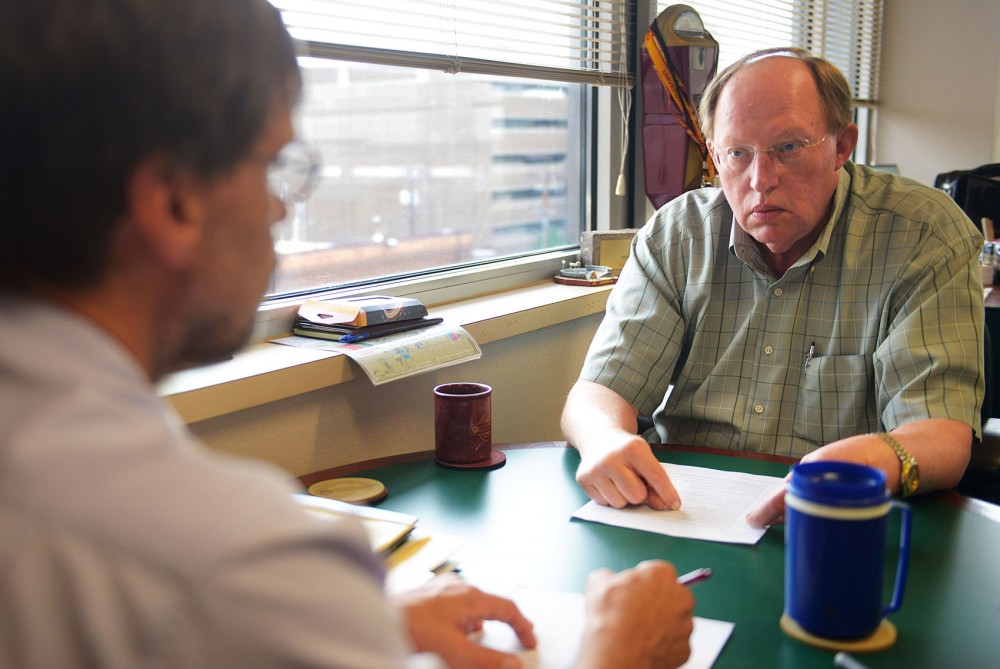When Bob Baker came to the University of Minnesota as a residence hall director in 1974, Territorial Hall housed only men.
He recalled the testosterone-filled dorm being “kind of crazy” and said he convinced the University to make it co-ed.
Nearly 40 years later, Baker said he still considers this one of his big
accomplishments.
Baker, now the executive director of Parking and Transportation Services, will retire in June. As head of the department for 23 years, he expanded parking space on campus by 50 percent, started the U-Pass program and advocated for the University’s interests regarding the Central Corridor light-rail line’s intersection of campus.
After working in Housing and Residential Life for about 15 years, Baker took a job as acting parking manager for the University’s then-called Parking Services, which he helped to expand to PTS in the early ’90s.
One of the biggest problems he worked to address after his move to PTS was the University’s shortage of parking spaces.
“We had about 80,000 people coming to the University, and we had about 12,000 parking spaces,” he said.
Baker oversaw the construction of six parking garages, including the Fourth Street Ramp and the East River Road Garage.
“There is this perception, I think, that’s still out there that parking is hard at the University,” Baker said. “What we tried to do was we tried to make it easier; we tried to make it friendlier.”
Though he said building parking garages fulfilled a need at the University, he’s proudest of starting the U-Pass, an unlimited bus pass for University students.
The U-Pass program and a redesign of the University’s campus shuttle system caused campus transit use to skyrocket, which he said was a great way to curb parking demand on campus.
“[The U-Pass] has provided a way to bring more people to campus without needing to deal with their vehicles, which is huge,” said Paula Pentel, coordinator of the University’s Urban Studies Program.
Pentel said one of the biggest transportation issues the University will face after Baker’s retirement is figuring out how to deal with bicycles on campus, including creating safe bike routes to and around campus.
Because it would be impossible for everyone coming to the University to park, Pentel said stepping up transit efforts around campus has been essential to its growth.
“You simply cannot build your way out of parking demand,” Baker said. “We quickly discovered that we really needed to change our message and tell people to leave their cars at home and to look for alternative transportation methods.”
Associate Vice President of Auxiliary Services Laurie Scheich started working with Baker in 1983 when she came to the University as a residence hall director. She said she’s come to appreciate his commitment to the University as well as his drive.
“He can get more done in a day than just about anybody I know,” she said.
Baker has great ideas, Scheich said, and is always looking at the future of parking.
“I’m gonna miss that ability to pick his brain on ideas,” she said. “He’s a good sounding board to bounce ideas
off of.”
‘At the table’
For the past eight years, Baker has represented the University’s interests in negotiations for the Central Corridor light-rail line, which will run through the University campus when it begins service in 2014.
Throughout light-rail negotiations, he said safety, research, aesthetics and future development opportunities were his top priorities.
In particular, Baker said he’s worked to protect the many laboratories on Washington Avenue from light-rail vibrations and electromagnetic interference.
“That’s what we do at this University,” he said. “We research, and we take that research and we apply it through teaching and through various business opportunities that we think will benefit society.”
Transportation Systems Design manager Sandy Cullen, who worked with Baker for six years on light-rail negotiations, said she’ll miss the “good cop, bad cop” rapport they used in the process.
“It was always great to have that leadership there,” she said.
Although his replacement hasn’t been decided, Baker said he trusts his team will be able to carry on smoothly after he leaves.
“If you’re gonna have any chance of success,” he said, “you gotta be organized, you gotta be at the table when decisions are made and you gotta be able to delegate, because if you try and do everything yourself, it isn’t going to get done.”
Baker said he looks forward to fishing, traveling and going for long walks with his wife at their lake home in Nisswa, Minn., where they’ll move as soon as he retires.











